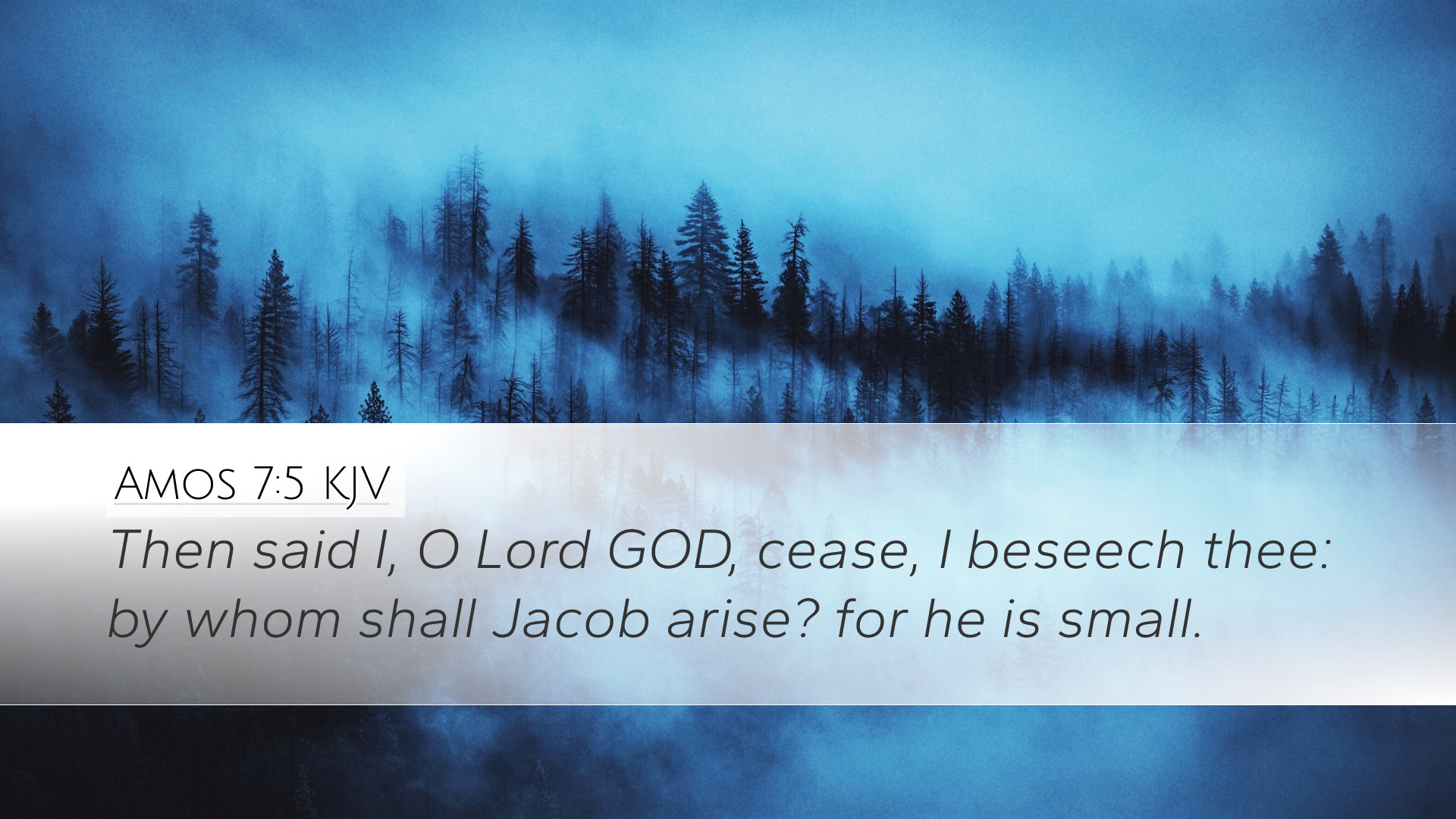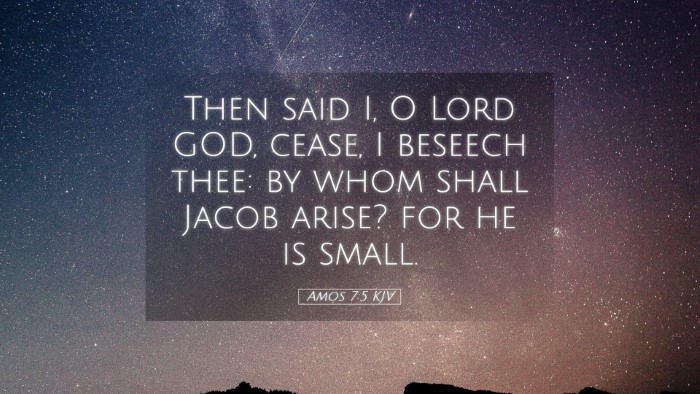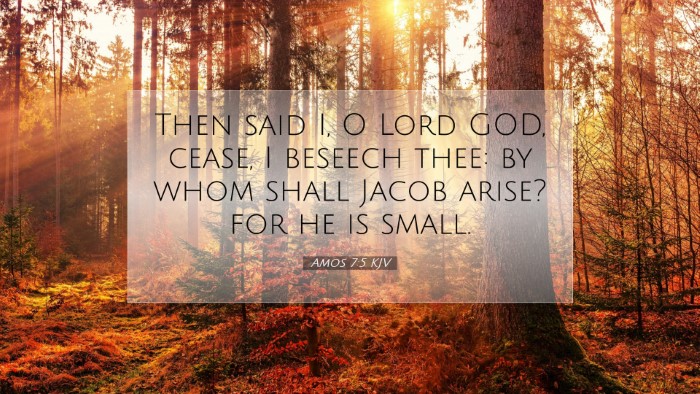Old Testament
Genesis Exodus Leviticus Numbers Deuteronomy Joshua Judges Ruth 1 Samuel 2 Samuel 1 Kings 2 Kings 1 Chronicles 2 Chronicles Ezra Nehemiah Esther Job Psalms Proverbs Ecclesiastes Song of Solomon Isaiah Jeremiah Lamentations Ezekiel Daniel Hosea Joel Amos Obadiah Jonah Micah Nahum Habakkuk Zephaniah Haggai Zechariah MalachiAmos 7:5
Amos 7:5 KJV
Then said I, O Lord GOD, cease, I beseech thee: by whom shall Jacob arise? for he is small.
Amos 7:5 Bible Commentary
Commentary on Amos 7:5
Amos 7:5 presents a profound moment in the prophetic narrative of Amos, as he intercedes for Israel before the Lord, acknowledging its dire situation and the impending judgment. The verse reads: "Then said I, O Lord God, cease, I beseech thee: by whom shall Jacob arise? for he is small." This verse encapsulates the essence of prophetic intercession and the weight of divine judgment. Below, the insights extracted from the works of Matthew Henry, Albert Barnes, and Adam Clarke offer a comprehensive commentary on this significant text.
Contextual Background
Amos was a shepherd and a fig tree farmer called by God to deliver a message of judgment to Israel during a time of relative prosperity but deep moral and spiritual decay. Chapter 7 introduces a series of visions that emphasize the impending doom facing the northern kingdom. In this context, the plea of Amos reveals his deep compassion and concern for his people.
Verse Analysis
-
Prophetic Role of Amos:
Amos’ intercession reveals the role of the prophet as a mediator. According to Henry, Amos “was afraid of judgment” and understood the gravity of the situation. His ethnic identity as a humble farmer aligns him closely with the common people he represents.
-
“O Lord God, cease, I beseech thee”:
This invocation highlights Amos’ desperate plea. As described by Barnes, it conveys both urgency and hope, as Amos seeks mercy for Israel’s sake. The repetition of “I beseech thee” emphasizes the sincerity of his intercession, drawing attention to God’s mercy and forgiveness.
-
“By whom shall Jacob arise?”:
The phrase raises a theological dilemma. According to Clarke, Amos understands Jacob as symbolic of the entire nation of Israel, appropriate in light of their frailty. The question indicates vulnerability and reliance on God—without divine intervention, Jacob's future appears bleak.
-
“For he is small”:
Henry notes that this smallness suggests both numerical weakness and spiritual insignificance. Israel’s moral corruption and forsaken love for God have led to a state of brokenness. Clarke further elaborates that the smallness also reflects their great need for divine support—their survival depends solely upon God's grace.
Theological Implications
-
Intercession and Divine Mercy:
This passage teaches the power of intercessory prayer. Amos’ act illustrates that even amidst imminent judgment, there is space for divine compassion. As noted by Barnes, the persistence of prayer can lead to mercy, significantly encouraging believers to approach God earnestly.
-
The Fragility of Humanity:
The acknowledgment of Jacob's smallness represents the fragility of humanity's standing before God. Clarke emphasizes that humanity often underestimates God’s expectations. The phrase reminds scholars and theologians to consider the gravity of sin and the need for humility before a holy God.
-
Judgment and Redemption:
This verse provides a nuanced understanding of divine judgment. Henry suggests that understanding the consequences of sin motivates deeper reliance on God. This notion invites discussion on the relationship between judgment and repentance, as well as highlights the continuous hope for redemption.
Practical Applications
The insights from Amos 7:5 are not merely historical but resonate in contemporary Christian contexts.
-
Call to Intercede:
Believers are urged to engage in intercessory prayer, advocating for those who are spiritually lost. The example of Amos demonstrates that powerful prayer can influence outcomes, reminding congregants to fervently seek God’s intervention for their communities.
-
Awareness of Injustice:
In light of Amos’ message against social injustice, contemporary theologians are challenged to address issues of inequity today. This verse invites reflection on how believers may advocate for justice within their circles of influence—as Amos did for Israel.
-
Emphasis on Humility:
The reference to Jacob’s smallness calls for personal humility in the face of God’s holiness. Pastors and church leaders can encourage congregations to cultivate a humble heart, recognizing their utter dependence on God's mercy.
Conclusion
Amos 7:5 serves as a rich text for understanding the character of God, the role of the prophet, and the nature of intercessory prayer. By combining the theological perspectives of Henry, Barnes, and Clarke, one gains a fuller appreciation for this poignant plea for mercy. It challenges believers to reflect on their responsibilities to intercede for others, to acknowledge their vulnerability before God, and to pursue justice in a world that often prioritizes power over righteousness. As scholars and pastors engage with this verse, may they find both challenge and encouragement in the weight of Amos’ words, reminding us that prayer still holds transformative power in the face of judgment.


